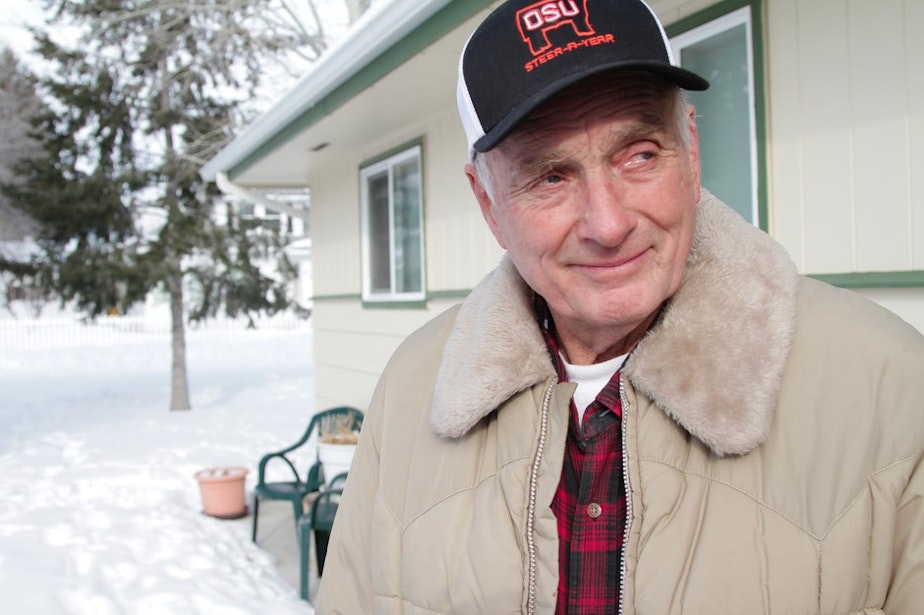Oregon Ranchers Whose Case Sparked Malheur Occupation Can Graze On Public Lands Again

As one of his last acts in office, ousted Interior Secretary Ryan Zinke signed off on returning grazing rights to the eastern Oregon ranchers whose prison sentences led to a 2016 standoff at the Malheur National Wildlife Refuge.
Dwight Hammond Jr. greets protesters outside his home in Burns, Oregon in January 2016. Hammond was convicted of arson on federal charges in 2012. The case sparked the Malheur National Wildlife Refuge Occupation led by Ammon and Ryan Bundy. CREDIT: AMELIA TEMPLETON/OPBRead OnBY CONRAD WILSON & AMANDA PREACHER / OPB
Convicted arsonists Dwight and Steven Hammond lost their grazing permits after they were sentenced on federal charges for igniting fires on public lands.
But President Donald Trump pardoned the ranchers last year.
The order grants the Hammonds, a long-standing pillar of the Harney County ranching community, a return of their 26,000 acres of federal land to graze cattle.
Zinke cited the pardon as part of his reason for restoring the Hammonds’ permit.
“I find that the pardons constitute unique and important changed circumstances since the BLM made its decision,” Zinke wrote.
During the 2012 trial of the Hammonds, jurors were told that Steven Hammond handed out matches to members of a hunting party he was with and told them to light and drop the matches on the ground, “because they were going to ‘light up the whole country on fire,’” according to a 2015 press release from the U.S. Department of Justice.
RELATED: Bundyville Podcast Tells A Story Of Anti-Government Extremism Set In The Rural West
Combined, the Hammonds served around 18 months in jail for the charges. But the Justice Department appealed the case, saying the men should each have served the federal mandatory minimum sentence of five years for destroying public property, meaning the land.
Many Harney County ranchers believed the Hammonds when they testified that those fires were to protect their land from invasive species and other wildfires. In 2016, Ammon Bundy and other anti-government activists seized the wildlife refuge in a standoff that lasted 41 days as a response to the Hammonds’ return to prison.
While Zinke’s order was signed weeks ago, it only came to the attention of the local field office in Burns on Monday, the first day the federal government had reopened following a 35-day long partial government shutdown.
“We’ve been given direction,” said Jeff Rose, the Burns district manager for the BLM. “We’re just going to work with the Hammonds to make it work. What we do in Harney County is figure it out and make it happen.”
Some Western ranchers cheered the decision to pardon the Hammonds. But environmentalists, including Aaron Weiss with the Center for Western Priorities, said the restored grazing rights send a dangerous message.
“It’s fine if they break the law because there are no consequences, as long as you’re a white guy with a ‘Don’t Tread On Me’ flag,” Weiss said.
Suzy Hammond, Dwight’s wife and Steven’s mother, said her family is grateful for the grazing permits news.
“We’re very appreciative of the industry people who have worked really long and hard in order to make things be right,” she said.
She added that the details of putting her family’s cattle back on the land haven’t been worked out yet.
“I don’t know if you’ve worked with the government before, but until you see it in black and white sometimes it doesn’t happen,” she said.
Hammond said it would mark a big change for the ranch if it happens.
“We’ve been running a ranch that’s half there,” she said.
RELATED: Bundyville Podcast Tells A Story Of Anti-Government Extremism Set In The Rural West
Copyright 2018 Oregon Public Broadcasting
Related Stories: [Copyright 2019 Northwest Public Broadcasting]
